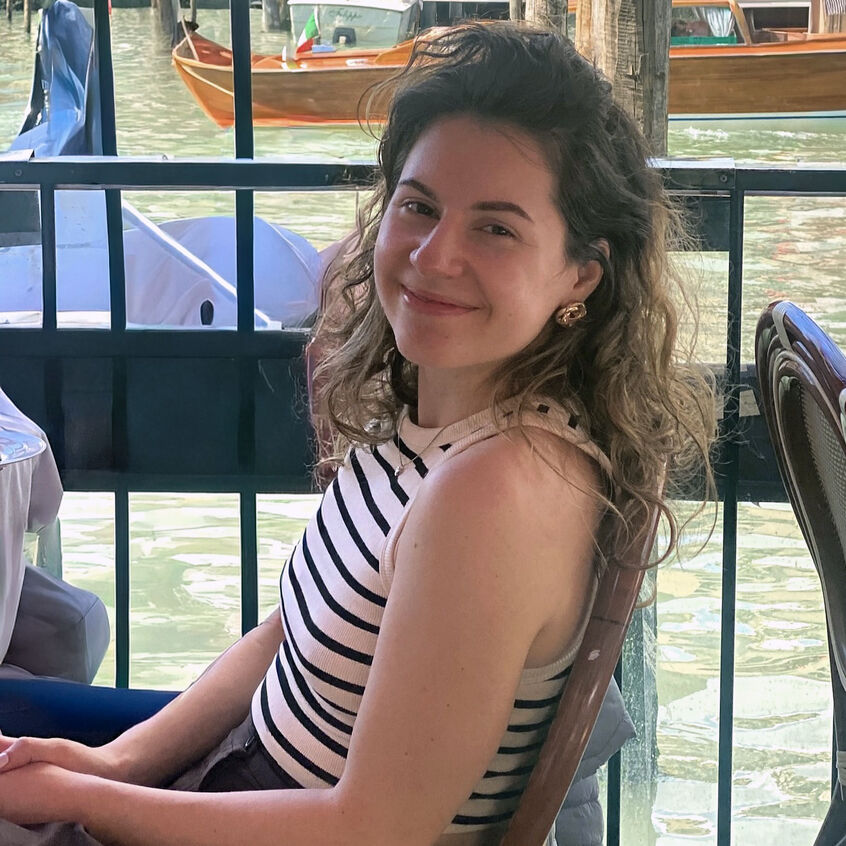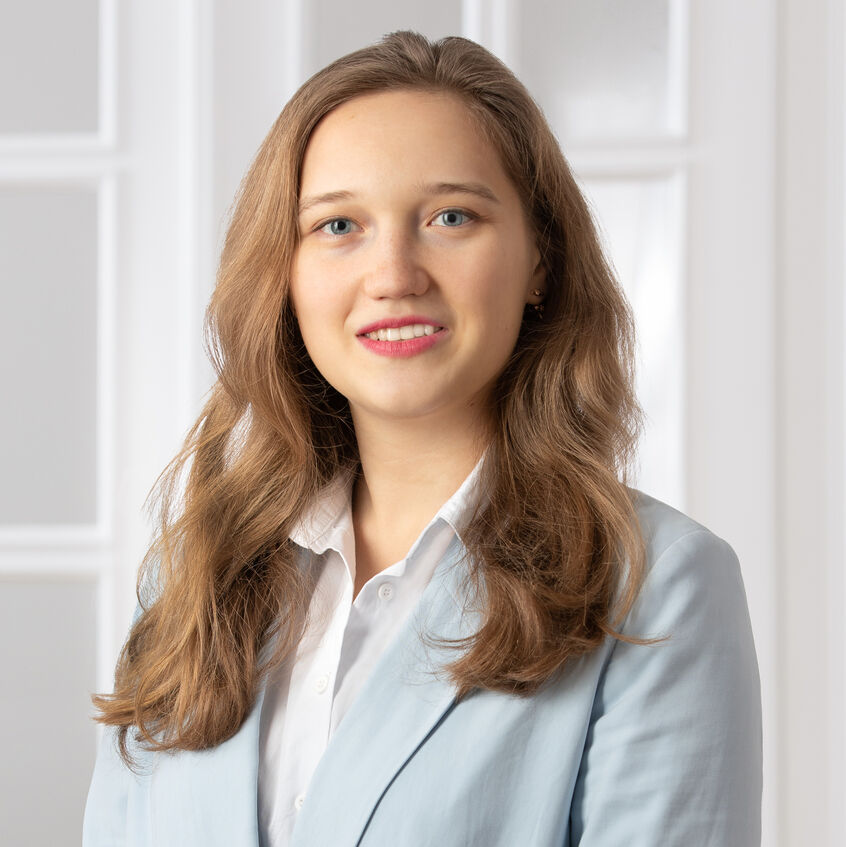Awardees – UNIVIE Research Awards for Students 2025/2026
Vira Pyrih
V. Pyrih, A. Rebmann, H. van der Aa: "LLMs that Understand Processes: Instruction-tuning for Semantics-Aware Process Mining"
Congratulations on the publication that has been accepted as a paper at the International Conference on Process Mining (ICPM 2025)!
The research contribution to this publication was developed as part of the master's thesis.
Abstract
Process mining increasingly relies on textual data to understand what should happen in a process, complementing traditional methods that focus only on observed behavior. Large Language Models (LLMs) are well-suited for such semantics-aware tasks, but current approaches rely on task-specific fine-tuning, which limits generalization. In this work, we explore instruction-tuning as a more flexible alternative - training LLMs on diverse prompt-answer pairs across multiple process mining tasks. Our results show clear improvements in prediction and discovery tasks, while mixed outcomes in anomaly detection across different models highlight the importance of carefully selecting and balancing the instruction data.

Matthias Fritz
M. Fritz, S. Benkner, E. Bajrovic: "Deadline-Aware Resource Allocation and Scheduling of Serverless Workloads on Heterogeneous Clusters"
Congratulations on the publication that has been accepted as a paper at the IEEE International Conference on Cluster Computing!
The research contribution to this publication was developed as part of the master's thesis.
Abstract
Serverless computing simplifies cloud application deployment through fine-grained pricing and automated resource management but offers little control over performance and hardware selection. This work introduces DHRT, a deadline- and heterogeneity-aware framework for scheduling and resource allocation of performance-critical serverless workloads. DHRT employs heuristic-driven online optimisation to refine resource estimates using real-time metrics and execution data from live invocations. By accounting for workload characteristics and heterogeneous nodes, it dynamically adjusts CPU allocations as workloads approach their deadlines. In experiments on synthetic workloads, DHRT outperforms baseline allocation schemes by improving resource efficiency and significantly reducing deadline violations without manual tuning.

Ekaterina Kuznetsova
E. Kuznetsova, C. Plant, A. Beer: "Parameter Selection for Density-based Clustering: Insights from Persistent Homology"
Congratulations on the publication that has been accepted as a paper at the 28th European Conference on Artificial Intelligence (ECAI-2025)!
The research contribution to this publication was developed as part of the master's thesis.
Abstract
Density-based clustering algorithms like DBSCAN are highly effective but sensitive to parameter selection, particularly the neighborhood radius (E) and the minimum number of neighboring points to form a cluster (minPts). We analyze and investigate the influence of the parameter settings onto the clustering outcome under the lense of persistent homology, a technique from topological data analysis. Persistent homology analyzes topological features, such as connected components and loops, across multiple spatial scales, improving clustering accuracy and robustness. We use the density-connectivity distance, a recent finding in the field, to allow full automatization of our approach. In extensive experiments, we demonstrate how insights from persistent homology can help to identify optimal parameter values and introduce an approach to automate parameter selection for density-based clustering. The proposed technique allows DBSCAN and related algorithms to perform effectively on a large variety of datasets without any user input. It combines topological insights with clustering techniques to provide a foundation for robust, automated approaches to complex data
analysis.

Manuel Zechmann
M. Zechmann, H. Hlavacs: "Comparative Analysis of Procedural Planet Generators"
Congratulations on the publication that has been accepted as a paper at the GAME-ON®'2025 conference!
The research contribution to this publication was developed as part of the master's thesis and the practical courses P1 and P2.
Abstract
This paper presents the development of two distinct real-time procedural planet generators within the Godot engine: one employing Fractal Brownian Motion (FBM) with Perlin Noise, and another adapting Minecraft-inspired layered noise techniques. We detail their implementation, including a quadtree-based Level of Detail (LOD) system and solutions for planetary mesh generation. A comparative user study (N=15) was conducted where participants explored unique instances generated by our two algorithms alongside two existing procedural planet projects.

Paul Pesak
P. Pesak, H. Hlavacs: "A Stealth Serious Game About Hiring Bias"
Congratulations on the publication that has been accepted as a paper at the Joint Conference on Serious Games 2025 (JCSG 2025)!
The research contribution to this publication was developed as part of the bachelor's thesis.
Abstract
Despite growing awareness, unconscious racism and sexism still affect hiring decisions. This paper investigates such bias through a serious game designed to raise awareness and observe player behavior. Participants made hiring choices in the game based on applicant "stats" and images. The results indicate the presence of significant hiring bias against women among several actors, particularly in the direct choice between male and female candidates and in the assignment of employees to traditionally male-dominated jobs such as construction workers. These findings confirm the continuing influence of gender bias in recruitment scenarios and suggest that unconscious bias can have a significant impact on recruitment outcomes.

Robert Ernstbrunner
R. Ernstbrunner, W. Gansterer: "Adaptive s-step GMRES with randomized and truncated low-synchronization orthogonalization"
Congratulations on the publication that has been accepted as a full paper at the 39th IEEE International Parallel & Distributed Processing Symposium (IPDPS2025)!
The research contribution to this publication was developed as part of the master's thesis.
Abstract
Iterative solvers for large, sparse linear systems are widely used on powerful supercomputers. When solving very large problems, communication poses a significant bottleneck, which has prompted the development of communication-avoiding algorithms. We investigate how these algorithms can be combined with novel randomization strategies and introduce a new approach that achieves up to four times the performance of the current state-of-the-art on a modern supercomputer.

Andrii Shkabrii
A. Shkabrii, T. Klein, L. Miklautz, S. Tschiatschek, C. Plant: "ReSL: Enhancing Deep Clustering Through Reset-based Self-Labeling"
L. Miklautz, T. Klein, K. Sidak, C. Leiber, T. Lang, A. Shkabrii, S. Tschiatschek, C. Plant: "Breaking the Reclustering Barrier in Centroid-based Deep Clustering"
Congratulations on the publication of the two papers that have been accepted as full papers at ICLR2025 and the SSCL and SSI-FM workshops at ICLR2025, respectively!
The research contribution to this publication was developed as part of the master's thesis.
Abstract
Deep clustering uses neural networks to automatically find patterns and group similar data together without needing labeled examples. In both works, we propose to improve existing deep clustering models using periodic resets of the network weights during training. We demonstrate that established centroid-based deep clustering methods achieve substantially higher accuracy when trained with our novel algorithms that overcome the performance plateaus and enhance the training with pseudo-labels. Our approaches use weight resets to avoid early over-commitment to initial cluster assignments and iteratively refine pre-trained models using their own clustering assignments. In experiments across multiple benchmark datasets, we observe consistent performance gains that deliver foundational contributions in deep clustering.

Nora Volina
N. Volina, H. Hlavacs: "Enhancing Programming learnability for Children through Video Games"
Congratulations on the publication that has been accepted as a master's paper at the 19th European Conference on Games Based Learning (ECGBL 2025)!
The research contribution to this publication was developed as part of the master's thesis and the practical course P2.
Abstract
The study centers on the development and testing of “Codonia,” an educational game that employs challenge-based learning and interactive feedback. Through qualitative and quantitative analysis, findings reveal that gamification significantly increases motivation and confidence, supporting problem-solving and logical thinking. The results suggest that well-structured educational games can complement or even surpass traditional teaching methods. By showcasing how digital learning environments foster experimentation and sustained engagement, this work contributes to ongoing discussions about innovative tools for programming education.

Dongzhou Fang
D. Fang, H. Hlavacs: "Teaching the Solar System with a Video Game"
Congratulations on the publication that has been accepted as a master's paper at the 19th European Conference on Games Based Learning (ECGBL 2025)!
The research contribution to this publication was developed as part of the master's thesis and the practical course P2.
Abstract
This research examines key aspects of educational game design, including game mechanics, virtual environments, and scientific simulations. By leveraging real-world astronomical data, the game provides an accurate representation of celestial bodies, planetary atmospheres, and orbital mechanics. Additionally, the integration of narrative-driven missions ensures that learning is embedded within engaging gameplay rather than being separate from it. The study also addresses challenges in balancing scientific accuracy with user engagement, optimizing the game's interface for effective information delivery, and evaluating its educational impact through user testing. The results demonstrate the potential of serious games to enhance STEM education by making complex scientific concepts more accessible and enjoyable.

